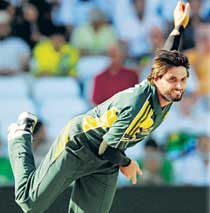2009 ICC World Twenty20 – A Review
Martyn Corrin |
Blink and you might well have missed it. Sixteen days is not a long time, and the Twenty20 World Cup has been and gone. In that time though, we have seen many ups and downs, and ultimately Pakistan emerged victorious in an interesting final with Sri Lanka. Let us take a look back at the competition.
It has been an interesting tournament. Time will tell whether this one ranks above the 2007 version, which was held in South Africa, but both Twenty20 World Cups to date have been by far and away superior to their most recent fifty over equivalent, a bloated tournament which may actually still be going somewhere. Twenty20 certainly has its critics, but more tournaments like this will see it become by far and away the most popular format of cricket in the coming years.
Given that it was held in England, the weather must be congratulated on not disrupting things too much during the competition. Only a couple of games were significantly shortened by rain; New Zealand and Scotland played a laughable game of Seven7 cricket and West Indies’ innings against England was shortened to just nine overs. It should not be underestimated how important it was to the tournament to have games that were generally contested as Twenty20 games; this has been vital to the success of the competition.
When a sporting contest succeeds though, credit has to go to the men involved. There have been some fine performances throughout this tournament, Umar Gul’s bowling against New Zealand takes the gold medal where he took an amazing five wickets for six runs. Gul came into the tournament with a great Twenty20 pedigree but leaves it with an enormous reputation in the shortest game. Bowling has been impressive by quite a few teams throughout the tournament. If anyone still believed the ‘Twenty20 is a batsman’s game and wickets don’t matter’ myth prior to the tournament, they shouldn’t anymore. It is no coincidence that the two finalists have some of the best bowlers in the tournament. Wickets restrict runs in cricket, and if you lose a couple of early wickets in Twenty20 you lose the freedom to hit out like you might want to. Perhaps the best example of this came during the final, where Sri Lanka lost early wickets and then found themselves behind the 8-ball the whole time. They were spared an embarassing total by some excellent death batting from Kumar Sangakarra and Angelo Mathews, but given the score those two managed to put on the board with six wickets down, Sri Lanka would have scored a lot more but for the lost wickets.
Similarly South Africa ripped apart the English batting line-up in the Super 8 stage, leaving England to post a paltry 111 – England were actually bowled out with a ball remaining, but were scratching around for runs throughout the innings once Luke Wright was dismissed early on. This bowling performance left South Africa as favourites, but they would fall to Pakistan in an exciting semi-final.
Similarly it has often been a misconception of Twenty20 cricket that intelligent batting is discouraged. Whilst ferocious hitting plays an important part (Chris Gayle played a monstrous innings against Australia early in the tournament), so does sensible and measured batting. Shahid Afridi, of all people, won the cup for Pakistan with a mature and unbeaten 54 in the final. It would have been easy for Afridi to come out and try and play what can only be assumed to be his ‘natural’ game, with an array of sixes before getting out. The situation didn’t call for that and he saw his team home safely.
Innovative batting has played its part throughout the tournament, perhaps the most notable shot has been the overhead paddle shot employed by Tilakaratne Dilshan. The shot is yet to earn itself a name (Nasser Hussain suggested the ‘Dilshan’) but is typical of the freedom and creativity that players feel able to play with in Twenty20. If a batsman got out playing such a shot in one of the longer games then they would be crucified by fans and the media, but Dilshan clearly feels comfortable playing the shot in Twenty20 where consequences are not felt to be as severe. And it wasn’t just a quirky little shot either – Dilshan top-scored in the tournament.
We have also seen the importance of good running. With such a short time availab le to score your runs and fours and sixes not freely available at all times, it is imperative for a batsman to be able to turn a one into a two, or even a none into a one. We saw this at the death of the tournament’s opening match, where the Netherlands’ batsmen raced ferociously to victory against a hapless England (though they were helped by fielding mishaps).
No World Cup in any sport is complete without its upsets, and this one delivered. The Netherlands victory alluded to above was the most remarkable and it set the scene for a great competition. In a tense last over the Netherlands ran their way to victory, escaping a couple of missed run-outs from Stuart Broad, and their nation rejoiced. Ireland actually managed to qualify for the Super 8 stage by virtue of beating Bangladesh in Nottingham and on the same day Australia were knocked out by eventual finalists, Sri Lanka. Australia’s early exit is perhaps not the shock you would expect it to be, because they picked a squad with limited experience in the format. There has been large criticism of Australia’s attitude to the format, and this will need to be addressed if they are to move with the times and embrace Twenty20 cricket. Similarly, their English counterparts need to learn how to bat in the shortest game, while India and New Zealand also underwhelmed.
The matches were interesting and the end result somewhat remarkable. Pakistan were a shambles in their opening match against England where they were completely annhilated. Much like their 1992 ODI side, they bounced back from this early disappointment, and whilst many tipped them to go out against the Netherlands (a victory by a small margin would have seen them knocked out) they bounced back, and batted and bowled well. Shahid Afridi was the ultimate hero with averages of 35 with the bat and 13 with the ball. Their whole team should take credit though, and it would be a hardfaced cricket fan who couldn’t find themselves to be pleased for their fans. They have suffered a lot in recent years, and deserve this victory. Pakistan were worthy winners of a fantastic tournament. Bring on the next one!





“Both Twenty20 World Cups to date have been by far and away superior to their most recent fifty over equivalent”.. in terms of what entertainment yes.. let’s see the 50 overs version is held every 4 years, this “roll the dice” version is held what every 2 years and there’s one more next year – please ask any true cricketer what the true test is and I guarantee you it’s not the Twenty20 version..Happy that the subcontinent teams have done well in this form of the game, but a bit of due respect..
Comment by phil | 12:00am BST 21 June 2009